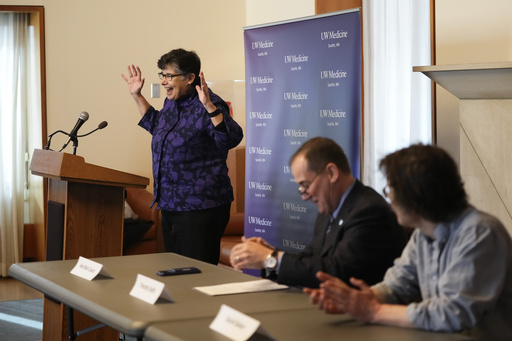LONDON — On Wednesday, the Nobel Prize in Chemistry was awarded to three prominent scientists for their groundbreaking techniques in decoding and designing proteins, which are fundamental to all life forms. Their innovative work, leveraging advanced technologies like artificial intelligence, has the potential to revolutionize the production of new drugs and materials.
The recipients of this prestigious award include David Baker, a biochemist from the University of Washington in Seattle, along with Demis Hassabis and John Jumper, both computer scientists affiliated with Google DeepMind, an AI research organization based in London.
Heiner Linke, who chaired the Nobel Committee for Chemistry, remarked that the recognition highlights research that has tackled a significant challenge in both chemistry and biochemistry for many years, emphasizing, “It’s that breakthrough that gets awarded today.”
The focus of this year’s Nobel Prize is on proteins, intricate molecules composed of thousands of atoms that adopt a myriad of shapes essential to their biological roles. Scientists have long aspired to efficiently design and assemble new proteins. The work of Baker, 62, whose research has garnered support from the National Institutes of Health since the 1990s, led to the development of a computer program named Rosetta. This program assists in analyzing vast databases of existing proteins to engineer novel ones that do not naturally occur. Johan Åqvist from the Nobel committee noted, “It seems that you can almost construct any type of protein now with this technology.”
Hassabis, 48, and Jumper, 39, developed an AI model capable of predicting the structures of virtually all known proteins, estimated to be around 200 million. Linke asserted that they “managed to crack the code” through their adept use of AI, enabling the prediction of complex protein structures found in nature.
The implications of this work are significant. The ability to tailor new proteins and gain deeper insights into existing ones could pave the way for the development of innovative medicines and vaccines. Moreover, Baker pointed out the possibility of designing enzymes capable of breaking down plastics and other waste to combat pollution, or creating entirely new materials for the semiconductor industry.
Baker expressed optimism about the prospects of crafting more effective medicines, highlighting a potential nasal spray designed to inhibit the spread of specific viruses, including COVID-19. He also mentioned a potential treatment to interrupt the cytokine storm, a dangerous inflammatory response.
Jon Lorsch, director at the NIH, commented on the significance of understanding how protein sequences fold into their respective structures, stating that this could enable the design of protein sequences to assume beneficial new forms.
Upon receiving news of their win, Baker experienced an ecstatic morning alongside his wife. “It was a little deafening,” he remarked. Conversely, Hassabis described a typical day at home when he received the life-changing call; initially, the Nobel committee reached out to his wife, who unintentionally disconnected a couple of times before recognizing the importance of the call. Jumper, on his part, expressed disbelief at the honor, stating, “It’s so incredible. It’s so unreal at this moment, and it’s wonderful.”
Hassabis, a key figure in the AI sector, co-founded DeepMind, which Google acquired in 2014. The organization previously developed an AI system that famously defeated a human world champion in the ancient game of Go. Traditionally, scientists would take months or even years to decipher the structure of a single complex protein. However, with DeepMind’s AI model, AlphaFold, researchers can determine the structure of a protein in mere seconds or minutes, thus saving invaluable time.
Both teams of researchers benefitted from each other’s work. Baker acknowledged that the advancements made by Hassabis and Jumper greatly propelled his team’s efforts. “The breakthroughs made by Demis and John on protein structure prediction really highlighted to us the power that AI could have,” he noted. Jumper remarked that this exemplifies how AI accelerates scientific progress, showcasing its potential to enhance research efficiencies significantly.
Interestingly, the recognition of these researchers comes in a year where multiple Nobel prizes have been awarded to individuals associated with AI advancements linked to Google. The Nobel Physics Prize was granted to Geoffrey Hinton, widely known as the “godfather of AI,” who previously worked at Google and has expressed concerns about the implications of AI.
Michael Kearns, a computer scientist based at the University of Pennsylvania, pointed out that the recipients of the Nobel in Chemistry signify a new generation advancing the work of earlier AI pioneers. They are making AI tools that are more scalable and applicable to crucial scientific challenges.
Baker will receive half of the 11 million Swedish Kronor (approximately $1 million) prize, with Hassabis and Jumper sharing the remaining portion.
The Nobel Prize announcements commenced with the medical prize awarded to researchers Victor Ambros and Gary Ruvkun earlier this week. The literature prize is anticipated this Thursday, followed by the Nobel Peace Prize on Friday and the economics prize on October 14. The funds originate from a legacy left by Alfred Nobel, the inventor of dynamite, and the laureates will be honored at ceremonies on December 10, coinciding with the anniversary of Nobel’s death.


